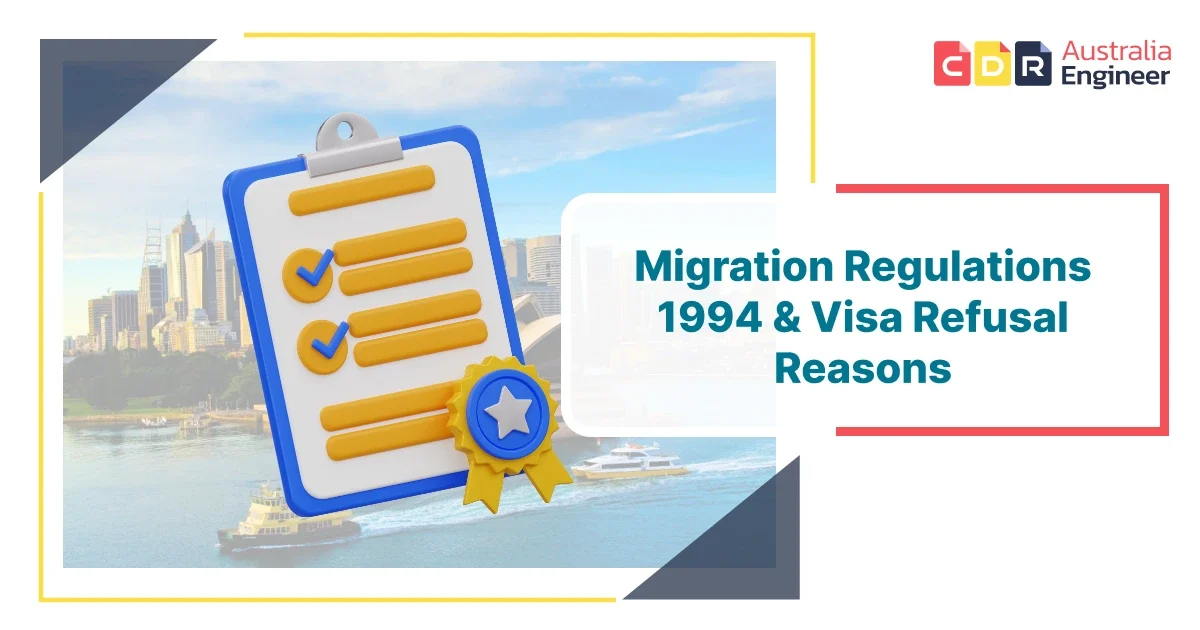

💥🥂 NEW YEAR GRAND DISCOUNT — Save up to 35% on Our Services. Offer Ends at 1st week of Jan
The Migration Regulations 1994 are an important part of Australia’s immigration laws. They work with the Migration Act of 1958 to make clear the exact legal requirements that must be completed for an Australian visa to be issued, rejected, or canceled.
The Migration Regulations 1994 are regulations that must be followed, but they are not as important as general migration guidance or policy. People who make choices have to look over applications extremely thoroughly according to these rules.
This means that the law, not what someone thinks, is utilized to assess if an application is qualified, compliant, and has enough evidence. Most of the time, visa applications are denied because the applicant didn’t fulfill particular standards, not because the government committed a mistake.

The Migration Regulations 1994 are a set of rules that the government issued under the Migration Act 1958. They make the Act work by laying out the rules that control:
The Migration Act sets the overall legal framework, but the regulations spell out specific, enforceable rules that decision-makers must follow.
Note: These regulations vary a lot to keep up with changes in immigration policy, the employment market, and promises made by the US to other countries. When applying or checking eligibility, applicants should look at the most recent edition of the Federal Register of Legislation.
To make things clearer, the Migration Regulations 1994 are split up into Schedules:
These schedules assist applicants and stakeholders in understanding how each type of visa is evaluated.
Australian migration law works on a hierarchy:
Aspect | Migration Act 1958 | Migration Regulations 1994 |
Nature | Primary legislation | Subordinate legislation |
Content | Legal powers, principles | Detailed visa criteria |
Flexibility | Amended by Parliament | Updated more frequently to reflect policy changes |
The Act and the Regulations both say that a visa decision must be made. If an application does not meet a requirement in the Regulations, the law requires that they be turned down, no matter what other grounds may support their case.
CDRaustraliaengineer specialises in high-quality CDR pathway reports for engineers. We offer low-cost, customised, and reliable services tailored to meet Engineers Australia’s standards.

CDRAustraliaEngineer helps engineers understand Migration Regulations 1994, visa requirements, and reasons for refusal. This helps them avoid mistakes and get their visas approved faster.
A legal process based on evidence is used to look at applications. All required criteria for the relevant visa subclass decision must be met to the satisfaction of decision-makers.
Important parts of the assessment:
Evidence is needed in many areas, but the assessment isn’t just a list of things to check off; decision-makers must be sure that each requirement is met.
This can include:
For example, people who want to get a skilled visa subclass 189 must pass a points test, a skills assessment, and an English language test. Our Competency Demonstration Report (CDR) services help competent people show that they have the abilities and certifications they need to move to Australia.
Public interest criteria apply to a lot of different visa categories, such as
For example, PIC 4020 is about giving fraudulent or deceptive documentation. If you don’t meet the required PICs, your application will be denied, no matter how strong it is in other areas.
Applications can also be turned down if they have:
These grounds are evaluated precisely within the regulatory framework, not as discretionary judgments.
Health and character qualifications are required by law, not optional. The rules say when health checks are necessary by law.
Not all visa refusals can be reviewed. Availability depends on:
The Administrative Review Tribunal (ART), which took over for the AAT in 2024, can look at certain refusals again and again to see if the facts and legislation are still the same. Many temporary visa refusals may have little or no merit review, and the only way to fix legal mistakes is through judicial review.
The Rules say:
For example, people who want a partner visa must meet the requirements for being a sponsor and having a true connection. Following the law doesn’t mean doing what people expect or handing in a bunch of papers.
If you’ve worked in a field but don’t have a formal qualification, our Recognition of Prior Learning (RPL) services are for you. Start your RPL evaluation right away to find out what you’re strong at.
In short, the Migration Regulations 1994 are the laws that govern how Australia makes decisions about visas. They make the rules for who can apply, what the public interest requirements are, and why a visa can be denied or canceled. Knowing these rules makes it clear that visa decisions are based on following the law, not just following the rules or having the right paperwork. Our professional resume writing services will help you get noticed by employers in Australia. Get Your Professional Resume Today to improve your chances of getting a job.
This material is purely for informational purposes and does not give advice on immigration or the law. The results of migration depend on the person’s situation, the law that was in effect at the time of the decision, and whether or not the person meets the required legal requirements.
The Migration Regulations 1994 are rules created under the Migration Act 1958 that set out the criteria, conditions, and public interest requirements that must be met when deciding on an Australian visa.
There are several visa subclasses that don’t have to follow the rules, including special category or non-program visas.
Yes. If the applicant does not meet the requirements set out in the Regulations for the relevant visa subclass, the visa must be denied. VETASSESS does skills tests for people who want to move to Australia. Make an appointment for your VETASSESS Assessment to officially check your abilities for immigration.
The kind of visa and the type of decision affect review rights. The ART can review some refusals, but only a court can examine others.
No. The Regulations are legally obligatory and must be followed by decision-makers. Migration policy is just a guide.
You can see the full rules in the Federal Register of Legislation.